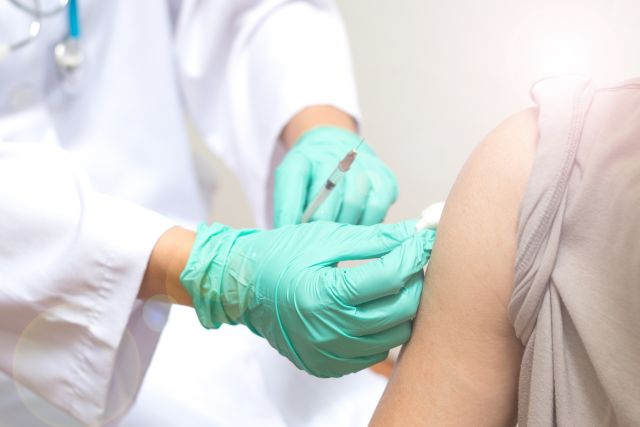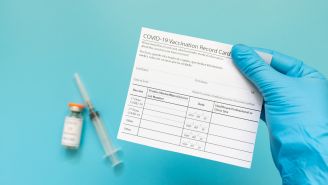Updated on October 6, 2021.
The Centers for Disease Control and Prevention (CDC) approved the U.S. Food and Drug Administration (FDA)'s decision to amend its emergency use authorization (EUA) for the Pfizer-BioNTech COVID-19 Vaccine, authorizing boosters for tens of millions of Americans, particularly those at high risk for severe disease.
In a September 23 statement, CDC director, Rochelle P. Walensky, MD, MPH, signed off on an extra dose for the following groups:
- People ages 65 and older should receive a booster shot
- Residents in long-term care settings should receive a booster shot
- People ages 50 to 64 with underlying conditions should receive a booster shot
- People ages 18 to 49 with underlying conditions may receive a booster shot
- People ages 18 to 64 years who are at increased risk for COVID-19 exposure and spread due to their job or institutional settings, such as prisons or homeless shelters may receive a booster shot—even if they are not at high risk for severe disease
These groups can get their Pfizer booster at least six months after they receive their second shot.
The CDC's approval followed a two-day meeting by the agency's Advisory Committee on Immunization Practices (ACIP)—an advisory group of medical and public health experts that develops recommendations on how to use vaccines to control diseases in the U.S.
Following a review of existing data, the ACIP upheld the FDA’s decision to authorize a third dose of the Pfizer vaccine for older and high-risk adults. The ACIP, however, voted against recommending boosters for health care and other frontline workers ages 18 to 64 years at high risk of infection due to their jobs. Dr. Walensky overruled this decision, concluding that frontline workers should also be eligible. Sign off from the CDC enables these additional high-risk groups to start receiving their additional shot.
To be clear, the CDC's approval expands the authorization for only the Pfizer COVID vaccine. Because it was the first COVID vaccine to become available in the United States, scientists have more data on its longer-term safety and effectiveness to evaluate.
Data on boosters for those who’ve received either the Moderna or Johnson & Johnson COVID vaccines should become available in the coming weeks, federal health officials say.
On August 12, however, the FDA amended the EUAs for both the Pfizer and the Moderna COVID vaccines to allow certain immunocompromised individuals—including solid organ transplant recipients or those who are diagnosed with conditions that similarly weaken their immune systems—to get a third dose of the same vaccine they already received.
Didn’t Biden say everyone was getting a booster?
In August, the U.S. Department of Health and Human Services (HHS) announced that as of September 20, COVID booster shots could be available to all Americans who have already received two doses of either the Pfizer or Moderna mRNA vaccines. The HHS suggested that these people could roll up their sleeves for a third shot, starting eight months after they got their second dose, pending a review by the FDA and the CDC.
This announcement was made before the FDA and CDC evaluated the data and made their own, independent determination. For people to start receiving booster shots, an FDA advisory panel meets, the FDA must amend its emergency use authorization and the ACIP must also convene to conduct a thorough review of the evidence. Then, the ACIP’s recommendation on the FDA authorization must be approved by CDC director, Rochelle P. Walensky, MD, MPH.
In a follow up address on September 9, Biden clarified the White House position on boosters, noting that the U.S. has the vaccine supply and distribution capability to provide first, second and third COVID shots to all Americans. Biden said that booster shots will be easily accessible—once they are authorized by U.S. health officials.
Why can’t everyone get a booster now?
While the coronavirus spreads quickly and unpredictably, scientists who develop vaccines in the U.S. must take a methodical, thorough, and reliable approach.
Currently, the scientists reviewing the data to assess the safety, efficacy and need for booster shots aren’t convinced that they are necessary for most Americans—at least not yet. Here’s why:
It’s too soon: While it’s true the data suggest that COVID vaccine protection wanes over time, most people who have already received two doses of the Pfizer vaccine still have sufficient immunity against the disease to prevent hospitalization or death.
An October 2021 Pfizer and Kaiser Permanente study published in The Lancet found that the effectiveness of the vaccine wanes over time, declining from 88 percent one month after injection to 47 percent five months later. But the study also found that Pfizer vaccine remained 90 percent effective in preventing hospitalization due to COVID-19 for up to six months.
When looking specifically at the Delta variant, the study found that the vaccine’s effectiveness against this highly contagious variant was 93 percent one month after infection but fell to 53 percent after four months. But overall, the Pfizer vaccine remained 93 percent effective against hospitalization due to infection with the Delta variant after six months. It was also 95 percent effective against hospitalization from other known variants.
Three studies published on August 18 by the CDC also showed that vaccine effectiveness against COVID-19 decreases over time and that an mRNA booster dose increases antibody levels by at least 10-fold (probably more).
But the research also supported one bright spot: existing vaccines have remained highly effective in protecting against severe COVID-19 and hospitalizations.
Bottom line: it may be that boosters are needed by otherwise healthy people, but many scientists suggest the data doesn’t yet support this decision.
Worries about myocarditis remain: Scientists have expressed safety concerns about a third shot for teens and young adults, suggesting the risk of myocarditis (inflammation of the heart muscle) or pericarditis (inflammation of the outer lining of the heart) among this age group could outweigh the benefits of a booster at this time.
Both myocarditis and pericarditis can lead to chest pain, shortness of breath and feeling like the heart is racing, fluttering, or pounding in the chest.
These complications are uncommon but not unheard of among young people receiving COVID vaccines. Health officials have identified 1,339 preliminary reports of this complication among people younger than 30-years old reported to the Vaccine Adverse Event Reporting System, according to the American Academy of Pediatrics (AAP). Of these reports, 742 have been confirmed and 494 are still under investigation. The CDC points out that this side effect was more common in male teens and young adults. It was also more common after the second dose.
Most patients with myocarditis or pericarditis who received care recovered quickly—95 percent of the 701 patients that were hospitalized have since been discharged. Still, these findings have heightened some scientists’ concerns about a third dose, which many believe just isn’t yet necessary.
Many people still need first and second doses: Many people already know someone who has received a third COVID shot. Since August 13, following the CDC’s approval of the FDA authorization of booster doses for certain people with weakened immune system, 2.16 million people have gotten an additional dose, the CDC reports as of September 19.
But it’s unclear of all these people are, in fact, immunocompromised.
Some fully vaccinated people who are ineligible for boosters are reportedly getting a third dose by telling pharmacies or clinics it’s their first shot or by falsely claiming that they meet the eligibility requirements for being immunocompromised.
Meanwhile, in San Francisco, health officials are offering a Pfizer or Moderna doses to those who got the Johnson & Johnson shot, referring to it as a supplement—not a booster.
The CDC cautions that there is not enough data to recommend an mRNA dose for anyone who received the Johnson & Johnson COVID vaccine. If boosters are eventually authorized for those who got this single-dose shot, they will likely get another dose of the same vaccine, the agency advises.
And while fully vaccinated people are focused on boosters, as of September 19, some 25 percent of people eligible for a COVID vaccine haven’t gotten even one dose. Health officials argue that getting everyone vaccinated is more important to ending the pandemic than dolling out boosters.
“I don’t think a booster dose is going to significantly contribute to controlling the pandemic,” said Dr. Cody Meissner of Tufts University during the September 17 FDA advisory meeting. “And I think it’s important that the main message we transmit is that we’ve got to get everyone two doses.”
An August 17th editorial in Nature underscored this view, asserting that the fact that so much of the U.S. and the world remains unvaccinated remains a bigger issue than administering boosters to people who are already vaccinated. The editorial pointed out that those who haven’t been immunized are much more likely to become infected, spread the disease and become severely ill or die than those who’ve gotten their initial doses.
The top priority of federal officials is to stay ahead of the virus, according to the August 18 joint statement from the HHS, CDC, FDA, the National Institutes of Health (NIH) and the National Institute of Allergy and Infectious Diseases (NIAID) and others.
“We also want to emphasize the ongoing urgency of vaccinating the unvaccinated in the U.S. and around the world,” they wrote. “Nearly all the cases of severe disease, hospitalization, and death continue to occur among those not yet vaccinated at all. We will continue to ramp up efforts to increase vaccinations here at home and to ensure people have accurate information about vaccines from trusted sources.”






